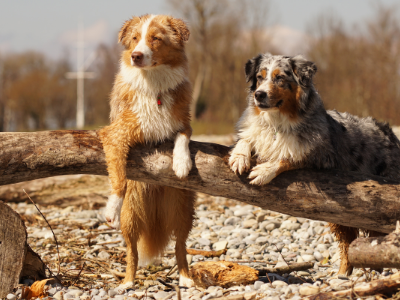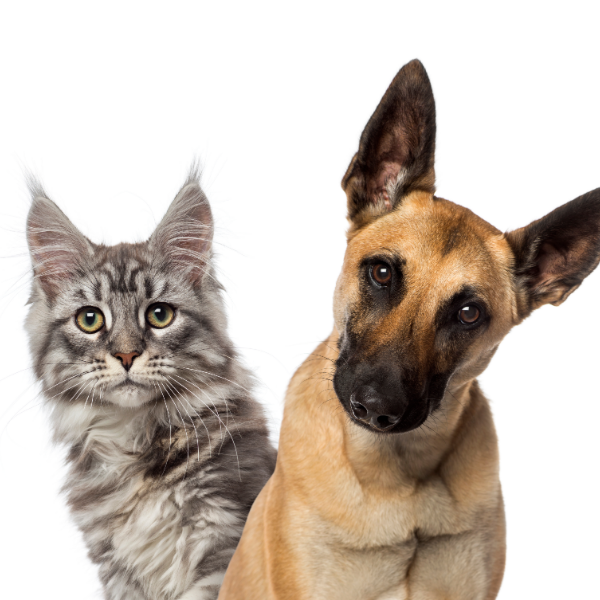You can't control everything about your pets' environment but there are a few things you can control. One of the major factors is diet. You can also control and customize an exercise/enrichment plan for your pet and even give supportive supplementation to ensure they have the best chance against cancer. Reducing daily stress is also a great way for you and your pet to avoid disease.
1. Diet
Diet is important because it can either help or hinder when it comes to cell regeneration. Going the extra mile includes looking at a species-appropriate diet to support the genetic code of your pet's DNA. Just like us, dogs and cats function best with foods they are genetically programmed to obtain nutrients from. For dogs, a balanced combination of meat, fish, eggs, organs, bones, and vegetables is best suited to prevent diseases including cancer. For cats are obligate carnivores and do best on an all-meat, fish, organ, and bone diet. This will eliminate the harmful ingredients found in commercially prepared diets such as high starch (sugar), low-quality processed meat products, rancid fats, preservatives, dyes, and more. Some of these ingredients are known carcinogens and all can be contributors to chronic disease and cancer formation.
3P provides a wide variety of fresh foods to cover your pet's nutritional needs.
2. Exercise & Enrichment
Exercise is extremely important for vascular health which increases the uptake of oxygen and nutrients of cells and body tissues. It also greatly affects the endocrine and cardiovascular which, in turn, affect every other system and cell in the body. Metabolic dysfunction is a key component of tumor formation in many forms of cancer. You and your pet should be getting at LEAST one hour of vigorous exercise per day, as long as your health permits it. The more, the better, for increasing endurance, enhancing cell function, and reducing cancer risks. Train smart, not hard, to avoid injury and reap the full benefits of cardiovascular exercise. Cross-training is a great way to reduce repetitive actions on the joints and limbs that could result in injury. A combination of running, agility, swimming, balancing exercises, and walking long distances is best. Older animals may benefit from more swimming and walking to further reduce joint stress.
Enrichment can also be provided in the form of skill development such as tracking, scent work, tricks, clicker training, and more. All of these exercises can be done with dogs and tricks and clicker training can even be done with cats! Reducing boredom will decrease stress and help you and your pet to have a closer connection and partnership. Connecting with your pet on a daily basis through these types of interactions can be extremely useful for reducing excess adrenal output and other potential metabolic problems in highly anxious animals and those with aggression issues.
3. Supplementation
Research shows that antioxidants such as vitamins A, C, E, the B vitamins, phytochemicals, and anthocyanins may be a key to preventing cancer and inflammatory disease within the body.
Fresh, species-appropriate foods for dogs and cats that contain them include muscle meat, organ meats, phytoplankton, oat grass, and other green foods, fish, and eggs.
Dogs will also benefit from a variety of leafy greens, berries, fruits, ground root vegetables, and raw grass-fed tripe from ruminant animals. 3P Naturals supplies most of these foods.
4. Reducing Stress
Doctors widely acknowledge that reducing stress is key for cancer and disease prevention. This might be partially due to the metabolic chaos that stress can create. Genetic processes may become confused with an endocrine system that is not at its best. Hormone dysfunction is a contributing factor in most forms of cancer.
Along with exercise and mental enrichment, you can reduce household stress by ensuring the relationships in the household are positive and happy. It's also important to ensure that everyone in the home gets along with the pets. Pets who display behaviors such as tail tucking, panting, hiding, excessive whining, pacing, excessive display of calming signals (yawning, avoidance of eye contact, licking, etc), or lack of appetite should be checked by a veterinarian to rule out health problems. If the pet is seemingly healthy after a veterinary check-up, it's time to get help from a pet behaviorist to identify possible sources of stress.
Natural stress relievers that can help with a behavior modification program include homeopathic remedies, herbs, Bach flower remedies, aromatherapy, massage techniques, and more.
Always check with your holistic veterinarian before making changes to your pet's health routine, especially if you're concerned there might be something wrong.
Check out the rest of our blog posting for nutrition tips!
For tips on how to recognize stress in your pet, see: http://www.3pnaturals.com/blog/is-your-dog-happy
And for more about fun activities: http://www.3pnaturals.com/blog/is-your-dog-happy-part-2-creating-activities-for-your-dog



